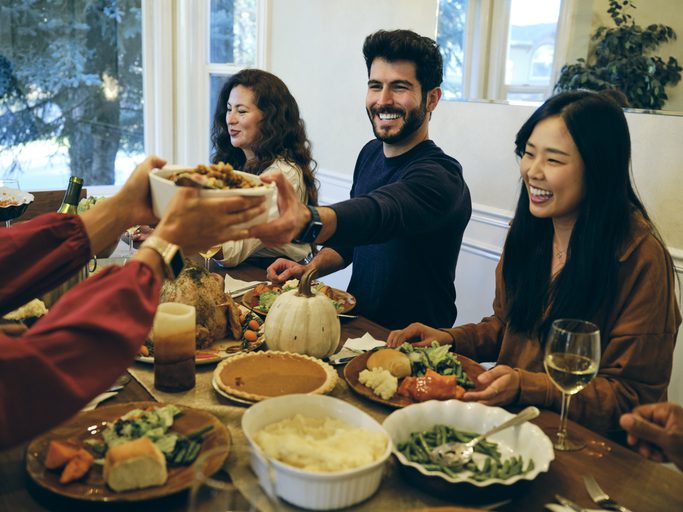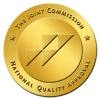If you’re in recovery from a mental health disorder, holidays like Thanksgiving can be difficult to navigate. If you typically celebrate with a large group of family members, you might not look forward to the questions about how you’re doing or the insensitive “teasing” you might get from those who don’t understand that your struggles are real.
So what do you do to protect your serenity? Skip the celebration altogether? Maybe, if that’s what you think is best. Or maybe your mental health has kept you away from such events in the past, and you’re ready to reconnect. Either way, we offer some tips for dealing with the types of people, questions, and comments that may cross your path on November 23.
The Skeptic
Some people simply refuse to believe that mental health disorders are real. Things like anxiety, depression, and bipolar disorder are largely thought-based, and thoughts aren’t tangible. An outsider can’t see what goes on in your mind–all they see is the behavioral effects of those thoughts. You may hear them say things like, “Just don’t worry about it,” or “Snap out of it, “ or “Smile!” They may think that you’re just trying to get attention, or that everyone should be able to control their behavior with a little willpower and discipline.
So how can you engage with the skeptic at your Thanksgiving table? Even if they don’t directly ask you how you’re doing, you might sense their judgmental attitude, which can make it hard to talk to anyone about your mental health condition within earshot of the skeptic. The advice we can give is three-fold:
- Don’t argue with the person. In most cases, someone with strongly held views about mental illness is not likely to change their mind, even when presented with evidence. One debate at Thanksgiving is just going to make you feel worse.
- Don’t talk about your mental health with that person. Either keep the conversation light or avoid the person when possible.
- If the person makes a hurtful comment about your behavior, don’t take it personally. Their bias is about their own mental and emotional state; it’s not really about you. You can just smile and walk away (or just walk away), or say something like, “Thanks for the advice,” then change the subject.
The Enabler
You’ll know the enabler by how they try to make everything easy for you, often by acting as if your mental health condition is no big deal. In this way, the enabler is like the skeptic–they either don’t really believe that your condition is serious or they believe that it can be “fixed” by ignoring it. For example, the enabler might insist that it’s okay to break your mental health routine for the holiday. You don’t really need to watch your alcohol intake or go on your morning walk–just relax! Let loose! Have fun! Some ways to deal with the enabler:
- Gently but firmly insist that your health routine is important and that you want to follow it, even during a holiday.
- Offer an alternative. If the person insists that you stay up late with everyone to play a game and you’re already feeling like you’ve reached your limit, say that you’re going to bed now but that you will happily play a game tomorrow.
The Persistently Inquisitive
This person expresses their concern in the form of nosiness. Even if they see you only once or twice a year, they want to know all about your mental illness–how it affects you, what treatment you’re getting for it, etc. Only you can know if their interest is based in genuine concern or in a sort of macabre desire to know all the “dirty” details. If you suspect mixed motives or if you simply don’t want to share everything about yourself with this person, you can say something like, “I appreciate your interest, and I’m doing well. How are you doing?” If they continue to persist, you might have to be straightforward and say, “I’d really rather not talk about it right now, but thanks for asking.”
The Know-it-All
You might encounter a person at Thanksgiving who wants to give you advice. Maybe they’ve done some reading about mental health or seen posts about it on social media and think they have some ideas you haven’t tried yet. Their ideas might range from changing the type of medication you’re taking to going off meds to investing in essential oils or going to church or quitting dairy products, etc. An easy response to this unsolicited advice is, “Thanks for the tip” or “I’ll consider it.”
Focus on the Ones You Love
If you’re in a family who understands mental health and offers you consistent love, support, and encouragement, you’re probably in store for a perfectly lovely Thanksgiving. But if your family celebrations tend to trigger you, either because of the types of people above or for other reasons, remember that your mental health is what matters most. Make the holiday one that you can survive with relative ease. Maybe this means just dropping in to say hello to the family and then going to dinner with friends you feel completely at ease with. Or maybe it means taking a friend with you to your family gathering–someone who can help you escape or offer a laugh or a shared eye roll when things with the family get weird.
And finally, remember to take a moment this Thanksgiving to reflect on what you’re grateful for. This might include your treatment team, the family members who support you, and yourself for all the work you’re doing to care for yourself.
Giving Thanks at Eagle View
You won’t encounter skeptics, enablers, know-it-alls, or gossips at Eagle View. Instead, we’ll listen to your concerns with compassion and determine a treatment plan that fits your specific needs. If you or a loved one need help navigating the triggers and stress of the holidays, contact our Bettendorf, Iowa, facility today.







